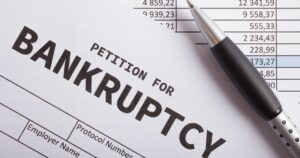Does your business qualify for a business bankruptcy? If your business is struggling to turn a profit or has excessive debt, it might be time to consider filing for bankruptcy. Bankruptcy is a lifeline for businesses, just as much as it is for consumers. Most business owners assume that if they need to file bankruptcy, they must file for the business. But, personal bankruptcy through Chapter 7 and Chapter 13 can also be a viable solution. It helps eliminate any personal liability that you (as the owner) may have, and you can move on with your life free from the burden of looming business debts.
Are You Liable for Business Debts?
You may not be personally liable for your company’s debts if:
- Your business is registered as a corporation.
- You are a limited partnership.
- You have an LLC (Limited Liability Corporation).
You are liable for business debts if:
- Your business is a corporation, LLC, or limited partnership and you have cosigned on a debt, personally guaranteed a debt, or you have personal and business liabilities that are mingled.
- You are the sole proprietorship.
- You are a general partner.
If you are considered personally liable for any debts associated with your business, it is in your best interest to file Chapter 7 or Chapter 13 bankruptcy, instead of just business bankruptcy.
The Different Chapters of Bankruptcy
As a business owner, you may be able to file Chapter 7, 11, or 13. It is best to speak with a bankruptcy attorney to find out which applies to your financial situation. While you may assume Chapter 11 is your best option, you may be surprised at how personal bankruptcy can help.
- Chapter 7 – This is often the best choice for small business owners. It eliminates all business and personal debts without payment plans – and does so quickly. It is simple, relatively affordable, and gives you a fresh start after a failed business.
- Chapter 13 – This is an alternative when Chapter 7 is not applicable. With Chapter 13, you can still eliminate a good portion of your debts – including business and personal. You will have a payment plan that is run through the court, but the amount will be reasonable, and you will typically be paid off in three to five years.
- Chapter 11 – Chapter 11 does not provide you with a fresh start, and you will be repaying all of the business debts back. The process can be complicated, but it does allow you to keep your business open – so you are not forced to shut down. If you want to save your business, Chapter 11 may be your better option.
Is Your Business Struggling? Contact Our Bankruptcy Attorneys
If you find that your business is struggling to pay debts, contact our attorneys today to explore your options. We will assess your financial liability, and help you determine which bankruptcy option is suitable for your business and personal finance needs.
Contact us today to schedule a consultation.

